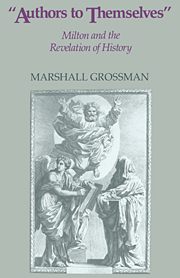2 - Exorbitant Desires
Published online by Cambridge University Press: 23 October 2009
Summary
Of Man's First Disobedience, and the Fruit
Of that Forbidden Tree, whose mortal taste
Brought Death into the World, and all our woe,
With loss of Eden, till one greater Man
Restore us, and regain the blissful Seat,
Sing Heav'nly Muse
(I. 1–6)In the opening lines of Paradise Lost, a series of transformations from metonymy to synecdoche projects a double movement of fall and restoration. The poem's second word, “Man's,” stands metonymically for “Adam's.” But Adam himself stands for “mankind,” as the “one greater Man” of line four stands for the “second Adam” of Christian Typology. As Adam includes mankind in his fall, Christ includes mankind in his resurrection. When understood from the retrospective view of revelation, first and second Adam are identified with each other because each acts for all men.
The logical force of this transition from metonymy to synecdoche is the introduction and reduction of difference. The centrality of this rhetorical transformation to the architecture of Paradise Lost will be discussed in Chapter 8, but I want to pause at this point to notice briefly the relationship of rhetorical tropes to narrative action that subtends my argument. If we think of narrative as transitive discourse, that is to say, discourse that records a change from one state of affairs to another, we may recognize the role of tropes in envisaging an articulate account of experience and motivating the transitions from one state to another. The figures of metonymy and synecdoche (along with metaphor and irony) each represent a distinct way of relating elements within poetic discourse. Metonymy substitutes one term for another, contiguous, but different.
- Type
- Chapter
- Information
- Authors to ThemselvesMilton and the Revelation of History, pp. 26 - 47Publisher: Cambridge University PressPrint publication year: 1988



